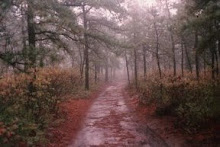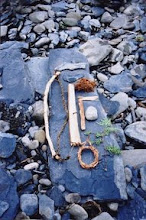
Finding a good study area for practicing your earth skills in the course can be challenging for those of you who live in a suburban or urban area. However, it makes it easier to do if you let go of your preconceived ideas of what your area should look like.
After all, most people think that it should be an idyllic, tranquill, forest cathedral, where deer eat out of your hand, and berries ripen as you need a snack. You would have miles of land to wander freely, undisturbed, as you gather the things you need to learn to survive.
Well, in case you don’t have the above situation, (and if you do, lucky you!) then you have to look for not just the perfect place to do your course, but one that will work for you, for your schedule, for your ability to travel and so forth.
Just for perspective: In the last ten years, people have camped in woods surrounding a public golf course, in their urban backyard, in an open lot near a working dairy farm and in the woods behind a busy shopping mall. With permission, of course!
Sometimes, it is good to plan your coursework where you can really get away, far from people and traffic and distractions, and then take your time building your shelter and camping and work through the material. And that idea sounds great at the time. Then suddenly, six months go by and you have only camped out once, and you are starting to worry that you might not get through the program. The distance, the time spent traveling, and juggling a busy family or work schedule can all take a toll on your course time, so adjustments have to be made to work it out.
If you don’t have a good area to do your skills right close to your home, look for someplace that is as close as possible. Sometimes you have to bring in materials for your shelter, or leaves/debris, whatever it takes, but the idea is to get out there often, and build up your experience by practicing the skills and sleeping in your shelter and just sitting by a fire you made yourself with your own skills. For that, you just need a place where you can get to it quickly, and where you can make it work.
Some people also consider coming out to Hawk Circle to do their coursework, if they are near us, and that can work also, but if it is far away, I tend to discourage it. However, any combination of these areas can work, and any nights spent in a shelter can count towards your course work if you journal it and keep working on your skills!
Places to consider: Churches, which often have land away from the actual place of worship. Boy or girl scout groups, who might be willing to trade land use for some good stories or skills shared with the troop. City or village regional parks, or local colleges. Fish and Game clubs (you might have to become a member of the club!) Remember that when you ask, even if they can’t give you permission, they may know someone else who might.
Don’t forget to take pictures, for your portfolio and include yourself, too. It really is awesome, years from now, to be able to look back and see how far you have come, and for your future students to see, too. I personally wish I had more pictures of my early practice and study time, as most of the time I was too cheap to take them, and the ones I did take got destroyed in the various moving I did in my early twenties. Ahhh, youth.....!
If you have a good idea for a study area, let us know!













No comments:
Post a Comment